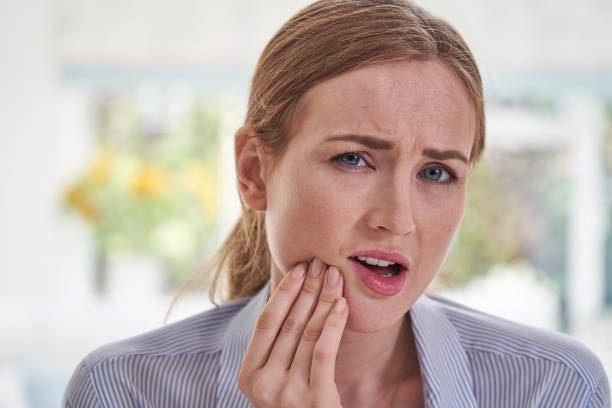
Portrait Of Young Woman Suffering With Toothache Touching Jaw
Table of Contents

Swelling of the roof of the mouth, also known as palatal swelling, can be a troubling and uncomfortable experience. This condition can range from minor irritation to a symptom of more serious underlying health issues. In this comprehensive guide, we will explore the causes, symptoms, diagnosis, and treatment options for swelling of the roof of the mouth, focusing specifically on how allergies and infections can trigger this oral health concern.
Understanding the Palate Structure
The roof of the mouth is made up of two main parts: the hard palate (front) and the soft palate (back). These structures play a crucial role in speech, eating, and separating the nasal passages from the mouth. Any swelling of the roof of the mouth can disrupt these functions and indicate an underlying health issue.
How to treat a swollen hard palate
Can a sinus infection cause swelling on the roof …
There is a small pore in the roof of my mouth …
Common Causes of Swelling of the Roof of the Mouth
1. Allergies
One of the most common reasons for swelling is an allergic reaction. This could be due to food allergens, pollen, pet dander, or even medications. The immune system’s overreaction causes inflammation and fluid buildup in the soft tissues of the mouth.
Symptoms of Allergic Reactions:
- Swollen palate
- Itchy throat
- Redness and irritation
- Sneezing and nasal congestion
2. Infections
Infections, both bacterial and viral, can lead to swelling of the roof of the mouth. Sinus infections, oral thrush, and even the common cold can cause the tissues in the mouth to swell.
Common Infections That Cause Swelling:
- Oral Thrush: A yeast infection that causes white patches and swelling.
- Sinusitis: Swelling due to sinus inflammation.
- Strep Throat: A bacterial infection that causes mouth and throat discomfort.
3. Burns or Trauma
Hot foods or drinks can burn the palate, causing temporary swelling. Physical trauma, such as from dental appliances or sports injuries, can also be a culprit.
4. Dental Issues
Dental infections like abscesses or severe tooth decay can radiate inflammation to the roof of the mouth.
5. Other Medical Conditions
Certain conditions like autoimmune diseases, oral cancer, or cysts can also result in palatal swelling.
Symptoms to Watch For
Knowing when swelling is a minor issue or a serious problem is crucial.
Key Symptoms Include:
- Pain or tenderness
- Redness and warmth
- Difficulty swallowing
- Fever
- White patches (possible fungal infection)
- Persistent swelling over a few days
If you experience any of the above for more than 48 hours, consult a healthcare professional.
Diagnosis and When to Seek Help
A medical provider may perform:
- Physical examination
- Allergy testing
- Oral swab for fungal or bacterial infection
- Imaging (CT scan or X-ray)
Note: You should seek immediate help if swelling causes breathing difficulty, high fever, or rapid onset of symptoms.
Treatment Options
Home Remedies
If the swelling is due to minor allergies or burns:
- Rinse with saltwater
- Use antihistamines
- Apply cold compress
- Stay hydrated

Medical Treatments
- Antibiotics for bacterial infections
- Antifungal medication for oral thrush
- Allergy medications or epinephrine for severe reactions
- Corticosteroids to reduce inflammation
Comparison Table: Allergies vs. Infections
| Feature | Allergies | Infections |
| Onset Time | Immediate or seasonal | Gradual (1-3 days) |
| Symptoms | Itchy throat, sneezing | Fever, pain, white patches |
| Swelling Duration | Short-term, comes and goes | Persists without treatment |
| Treatment | Antihistamines, avoid triggers | Antibiotics or antifungals |
| Associated Conditions | Asthma, eczema | Sinusitis, thrush, strep throat |
Prevention Tips
- Avoid known allergens
- Practice good oral hygiene
- Use a humidifier in dry climates
- Avoid overly hot foods
- Visit the dentist regularly
When Is Swelling Serious?
Swelling that comes with the following symptoms should be considered serious:
- High fever
- Breathing difficulty
- Swelling that spreads to face or neck
- Swelling that does not go away in 2-3 days
These signs may indicate a deep infection or anaphylaxis, both requiring urgent care.

Internal and External Resources
Internal Link (from Database Town):
- Oral Health Complications You Shouldn’t Ignore
External Link (Authoritative Source):
Frequently Asked Questions (FAQs)
Q1. Can allergies cause swelling in the roof of the mouth?
Yes, allergies to food, pollen, or medications can lead to swelling due to the body’s inflammatory response.
Q2. How do I know if my swollen palate is due to an infection?
Infections usually come with other symptoms like fever, pus, white patches, and longer-lasting discomfort.
Q3. Is swelling of the roof of the mouth dangerous?
In most cases, it’s not serious, but if accompanied by breathing issues or fever, seek medical attention.
Q4. Can dental issues cause the roof of my mouth to swell?
Yes, tooth infections or abscesses can spread and cause swelling in adjacent oral tissues, including the palate.
Q5. How can I reduce swelling in the roof of my mouth quickly?
Try cold compresses, saltwater rinses, and over-the-counter medications. If symptoms persist, consult a doctor.
Conclusion
Swelling of the roof of the mouth can result from various causes, with allergies and infections being among the most common. While some cases are easily treatable at home, others may require medical intervention. Early diagnosis and proper treatment are essential to prevent complications. For more expert articles and updates on oral health, visit Database Town regularly.
Would you like me to generate a meta title and meta description for this article as well?Swelling of the roof of the mouth, also known as palatal swelling, can be a troubling and uncomfortable experience. This condition can range from minor irritation to a symptom of more serious underlying health issues. In this comprehensive guide, we will explore the causes, symptoms, diagnosis, and treatment options for swelling of the roof of the mouth, focusing specifically on how allergies and infections can trigger this oral health concern.
Also read
Artificial Intelligence Argumentative Essay (Real Life Examples Included
Which Business Case Is Better Solved By Artificial Intelligence?
How AI is Changing the Future of Work?
11 Benefits of AI in Everyday Life | AI Advantages Unplugged
Difference Between Data Science VS Networking
Difference Between Data Science VS Economics
Data Science VS Accounting (Key Differences & Similarities)
Best 10 Creative Lemon Balm Recipe Ideas 2025
The Ultimate What Does BBL Stand for and Its Meaning 2025
A Complete Guide to “Ear Cleaning Near Me” Facilities within Your Area 2025



